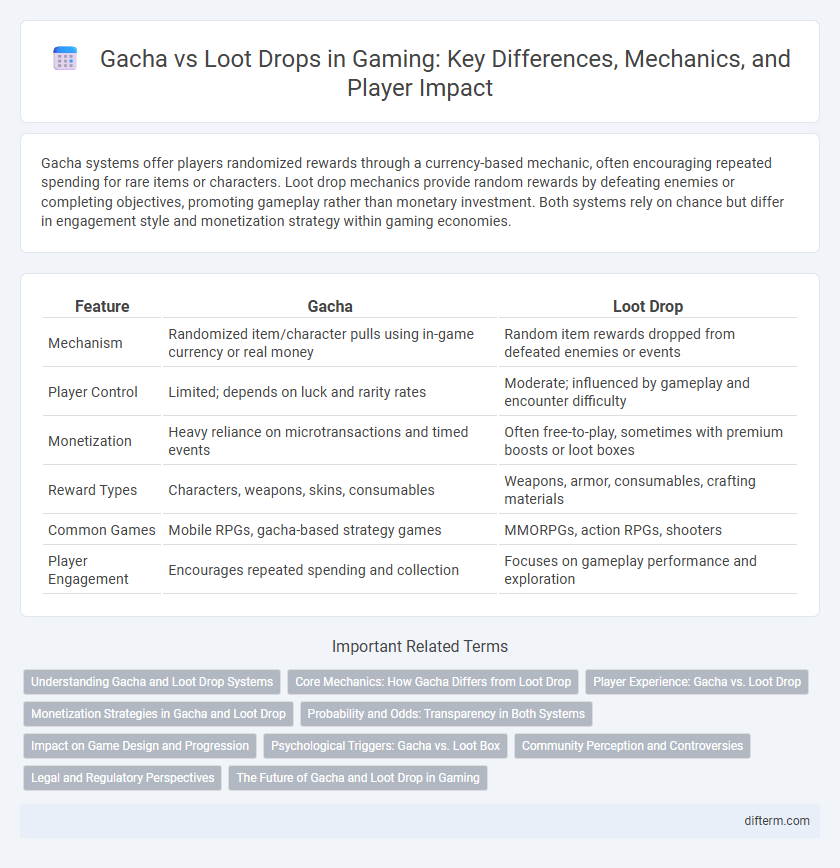Gacha systems offer players randomized rewards through a currency-based mechanic, often encouraging repeated spending for rare items or characters. Loot drop mechanics provide random rewards by defeating enemies or completing objectives, promoting gameplay rather than monetary investment. Both systems rely on chance but differ in engagement style and monetization strategy within gaming economies.
Table of Comparison
| Feature | Gacha | Loot Drop |
|---|---|---|
| Mechanism | Randomized item/character pulls using in-game currency or real money | Random item rewards dropped from defeated enemies or events |
| Player Control | Limited; depends on luck and rarity rates | Moderate; influenced by gameplay and encounter difficulty |
| Monetization | Heavy reliance on microtransactions and timed events | Often free-to-play, sometimes with premium boosts or loot boxes |
| Reward Types | Characters, weapons, skins, consumables | Weapons, armor, consumables, crafting materials |
| Common Games | Mobile RPGs, gacha-based strategy games | MMORPGs, action RPGs, shooters |
| Player Engagement | Encourages repeated spending and collection | Focuses on gameplay performance and exploration |
Understanding Gacha and Loot Drop Systems
Gacha and loot drop systems both serve as core mechanics in gaming to reward players with randomized items, but they differ fundamentally in their execution and engagement. Gacha typically involves a currency-based system where players spend in-game or real-world currency for random virtual items, often emphasizing collection and character acquisition. Loot drop systems generate rewards passively through gameplay, where items are randomly obtained from defeated enemies or completed missions, fostering progression and replayability.
Core Mechanics: How Gacha Differs from Loot Drop
Gacha systems rely on virtual currency to 'pull' randomized items or characters, emphasizing chance-based acquisition that often mimics real-world capsule toy machines. Loot drop mechanics reward players through item drops from defeated enemies or completed missions, with rarity typically influenced by game design algorithms tied to player engagement. Gacha focuses more on monetization and collection, while loot drops prioritize gameplay progression and reward skill or effort.
Player Experience: Gacha vs. Loot Drop
Gacha systems create a sense of excitement and unpredictability by offering randomized rewards with varying rarity, directly influencing player engagement through repeated transactions. Loot drop mechanics enhance gameplay satisfaction by rewarding skill or effort, creating a tangible connection between player actions and in-game rewards. The player experience between Gacha and loot drops diverges significantly, with Gacha emphasizing chance and collection, while loot drops prioritize achievement and progression.
Monetization Strategies in Gacha and Loot Drop
Gacha monetization strategies rely heavily on randomized character or item draws, incentivizing repeated purchases through rare, limited-time offers and collection mechanics. Loot drop systems monetize by encouraging continuous gameplay or microtransactions to increase drop rates or acquire keys and boxes, often blending fairness with chance to maintain player engagement. Both models exploit player psychology by balancing reward frequency and rarity, driving revenue through emotional investment and desire for exclusive content.
Probability and Odds: Transparency in Both Systems
Gacha systems often display explicit probability rates for each character or item, enhancing player awareness of odds before each pull, whereas loot drop mechanics typically rely on hidden or varied drop rates determined by in-game events or enemy types. Transparency in gacha games promotes informed decision-making and reduces player frustration by clearly communicating chances, while loot drops maintain unpredictability to encourage repeated gameplay and exploration. Both systems utilize probability, but gacha's explicit odds contrast with the more opaque, randomized nature of loot drops.
Impact on Game Design and Progression
Gacha systems heavily influence game design by encouraging repeated microtransactions through randomized character or item draws, directly affecting player progression with variable rewards and fostering long-term engagement. Loot drop mechanics impact progression by rewarding skill and exploration, offering a more predictable advancement path through distinct rarity tiers and drop rates carefully balanced by developers. Both systems shape player behavior and retention, with gacha models often accelerating monetization while loot drops emphasize gameplay mastery and gradual improvement.
Psychological Triggers: Gacha vs. Loot Box
Gacha systems leverage the psychological trigger of variable-ratio reinforcement, creating anticipation through randomized item acquisition, which increases player engagement and spending by simulating chance-based rewards. Loot boxes similarly exploit uncertainty and reward expectancy but often tie directly into game progression or cosmetic upgrades, enhancing perceived value through exclusive content. Both mechanisms capitalize on players' desire for novelty and surprise, but Gacha's consistent use of collectible characters or items tends to foster longer-term attachment and repeated investment.
Community Perception and Controversies
Gacha systems often face criticism for promoting gambling-like mechanics and predatory monetization, which leads to divided community perception compared to traditional loot drop systems that are seen as fairer and more transparent. The controversy surrounding gacha centers on its randomized item acquisition fueled by microtransactions, raising ethical concerns about encouraging addictive behaviors in vulnerable players. Many gamers advocate for stricter regulations on gacha mechanics, while loot drop systems maintain broader acceptance due to their perceived balance between reward and effort.
Legal and Regulatory Perspectives
Gacha mechanics and loot drops face increasing scrutiny under global gaming regulations due to their similarities with gambling, with key legal debates focusing on transparency and player protection against exploitative monetization. In jurisdictions like Japan and the European Union, stringent laws mandate clear disclosure of odds and impose age restrictions to mitigate gambling-like risks inherent in randomized reward systems. Regulatory bodies emphasize consumer rights, pushing developers to implement fair chance policies and restrict misleading practices to ensure compliance and ethical monetization frameworks in gaming.
The Future of Gacha and Loot Drop in Gaming
The future of Gacha and loot drop systems in gaming is set to evolve through increased integration of blockchain technology, offering verifiable digital ownership and enhanced player trust. Game developers are experimenting with dynamic drop rates and personalized reward algorithms to balance player engagement and monetization ethically. Emerging trends suggest a shift towards more transparent and player-centric loot mechanics, aiming to create sustainable gaming economies and improve overall user experience.
Gacha vs Loot Drop Infographic

 difterm.com
difterm.com